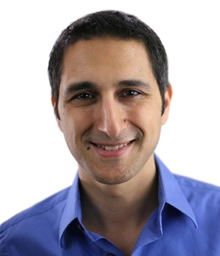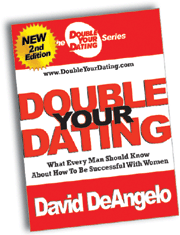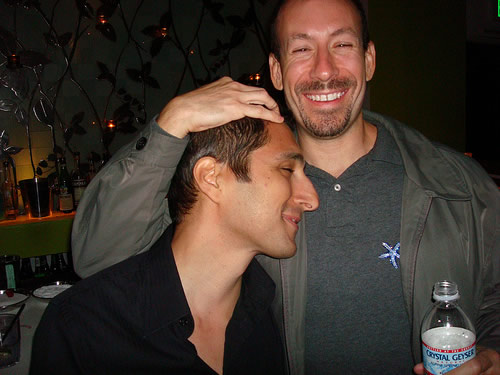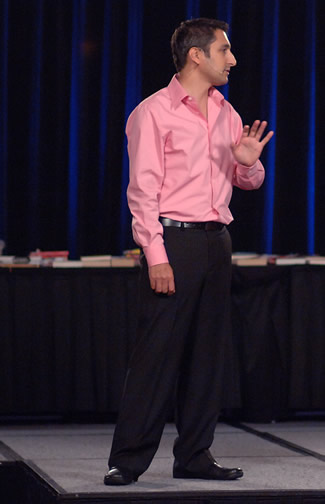
Eben Pagan from Hot Topic Media is with me for this interview. You might be more familiar with him by the name David DeAngelo and Double Your Dating. He has helped a lot of guys who are lost when it comes to getting a date. I thought we would cover marketing, split-testing, and Double Your Dating. Instead the conversation went in a completely different direction. We ended up talking about philosophy, Ayn Rand, Maslow’s hierarchy of needs, and insight from psychologist Claire Graves. Eben talks about how and why the Internet gives us all opportunities to make a difference in the world. I think it is the first time I’ve had a conversation like this during an interview.
Full Interview Audio and Transcript
Personal Info
Hobbies and Interests: Guitar, travel, yoga, and psychology.
Favourite Sports Teams: Doesn’t follow sports.
Favourite books:
- Think and Grow Rich by Napoleon Hill,
- The Seven Mysteries of Life by Guy Murchie,
- Kosmic Consciousness by Ken Wilber,
- The Science of Enlightenment by Shinzen Young.
Favourite Entrepreneurs: Jay Abraham, Steve Jobs, Richard Branson.
Fast Track Interview
Adrian Bye: Today, I’m interviewing Eben Pagan. I’ve actually known Eben since 2001. He’s been very successful in a lot of different areas on the Internet and got started when a lot of things were just beginning. I’m really excited to have him here. Eben, thanks for joining us. Why don’t you tell us a little bit about who you are and where you come from?
Eben Pagan: Absolutely. The short version is that I’m a self-made guy. I grew up poor in the woods in Oregon. I didn’t really know anyone that was successful. I had to work hard and find my own way.
I tried real estate when I was in my early 20s. I didn’t do very well at it, but I discovered marketing and sales as a result of trying to succeed in the real estate world. I realised that good marketing isn’t just about convincing people to buy stuff; it’s about communicating value.
I went on to start my own consulting business for real estate and mortgage companies where for three years I taught marketing, sales and how to build business. Then in 2001, I started an Internet marketing business by writing an e-book and putting it online. That was a game-changer for me because before that I had never built a website. I got a copy of Microsoft FrontPage, locked myself in my bedroom, and started building my website. I had to figure it all out: how to do e-mail, how to get traffic and how to take payments.
The day the website came online, I sold two or three copies of my book. I realised something big was going on, so I started to build the business. Now seven plus years later, I have a team of about 80 full-time employees. We’re probably running at $25 million a year in sales.
We’ve launched several businesses in various niches, mostly in the relationship and dating advice space as well as the business marketing and Internet marketing space. We have a coaching program where we teach others how to publish and make money by selling information products on the Internet.
Adrian Bye: Let’s talk about the first business. Obviously, you’re the infamous David DeAngelo and this is Double Your Dating. I’ve read and studied your stuff and I think every guy should do the same. But what made you qualified to teach it?
 Eben Pagan: Boy! I don’t think I would say I’m qualified at all. Here’s what I see happening right now. Modern reality is not about having letters after your name nor is it necessarily about having qualifications or certifications. Modern reality is about wanting to learn different things because your basic Maslow’s hierarchy of needs are met. I want to learn cool stuff like how to improve, how to go on adventures and how to play video games. I want to learn how to have a better relationship. I want to learn how to be healthier. All people are really going after is knowledge.
Eben Pagan: Boy! I don’t think I would say I’m qualified at all. Here’s what I see happening right now. Modern reality is not about having letters after your name nor is it necessarily about having qualifications or certifications. Modern reality is about wanting to learn different things because your basic Maslow’s hierarchy of needs are met. I want to learn cool stuff like how to improve, how to go on adventures and how to play video games. I want to learn how to have a better relationship. I want to learn how to be healthier. All people are really going after is knowledge.
I’m no exception. I’m a knowledge junkie. I went through a phase in my life where I was single, and I couldn’t get a date to save my life. I started reading books, going to seminars and getting to know dating experts. I found the stuff others were teaching was rehashed from decades ago, seemed corny and ridiculous, was for relationships after you get a date, or was something that seemed a little manipulative or sneaky.
Then I started hanging out with guys that really understood dating and attraction; they were naturals. I watched what they did and paid attention. They were doing things that no one else I had found really noticed. I’d write down what I saw and ask questions, and then I’d go try something. I stumbled across a whole body of knowledge that other people knew about but didn’t know they knew; they didn’t know it was important.
I took that knowledge, codified it, put it into a system, figured it out for myself and then wrote a book. My “qualification” is that I can get the result. I can get the job done and show you how to do it.
Adrian Bye: Can you talk a little bit about the model of what happens through your process and what you do afterwards?
Eben Pagan: Sure. What most entrepreneurs and newbies, who start businesses, are trying to do is just get people to buy their product. They don’t realise that almost all of the money in a business is made after the customer buys their first item and then returns to buy additional items.
When I started, it was just an e-book. Then we started offering a free e-mail newsletter. When you sign up for the e-mail newsletter, I’m going to communicate with you multiple times on a constant basis. Maybe you won’t buy today. It might take 10, 20 or 50 communications before you finally buy.
When we created our e-mail newsletter, my goal was to create the most valuable newsletter in the world on any topic and then to give it away for free because the Internet allowed me to distribute and syndicate content economically. I can sign up for an auto-responder system, load my list of 10,000 or 100,000, and email that list every few days for $20 a month. Nothing equal to this has ever been available to the average person. The closest you could get was radio or TV, which required serious money and skill; you had to be a real pro to do it. An e-mail newsletter is simple.
Now our model depends completely on the backend. We sell information products, so we’re basically selling knowledge, techniques, and systems for getting the particular results you want in life. We create a curriculum where you start with one program, then we recommend the second, third, and fourth one. We created a technology platform that automatically up-sells and remarkets other products in a certain sequence when someone buys one of our products.
Adrian Bye: Where are you headed long-term?
 Eben Pagan: Honestly, I’m one of these weird new-age entrepreneur types that actually thinks I might be able to make some kind of difference in the world in a significant way down the road. Maybe not me as an individual but as someone that influences and is connected to a lot of other people who are concerned about the bigger issues we are facing as a species and as a planet. All of this stuff I’m trying to do has helped in some way for the world to evolve and solve different problems.
Eben Pagan: Honestly, I’m one of these weird new-age entrepreneur types that actually thinks I might be able to make some kind of difference in the world in a significant way down the road. Maybe not me as an individual but as someone that influences and is connected to a lot of other people who are concerned about the bigger issues we are facing as a species and as a planet. All of this stuff I’m trying to do has helped in some way for the world to evolve and solve different problems.
I have a lot of passion around education. If you look at various problems that occur in human interactions and in human development, a lot of them stem from the fact that people don’t have access to education. My gut tells me that the Internet is a huge leap forward in being able to solve many things, such as overpopulation and disease. Ultimately, I’d love to help channel the power of technology and use it to get all of us further educated.
Entrepreneurialism is a big piece of that puzzle as well. Lately, I’ve been teaching entrepreneurs how to start businesses and teaching authors, speakers, and coaches how to publish their own stuff. My hope is to be able to combine technology, education, and entrepreneurialism while mobilising more of the people who are concerned about our planet, where we’re going, some of the challenges we face and trying to focus them on solving some of these problems.
Adrian Bye: Why are you in the entrepreneurial world? Why not do that in a non-profit or government world?
Eben Pagan: Great question. I would love to work in those worlds, and I’ve started helping some folks that do. From what I know of government and non-profits, they’re not very good at execution or doing things in a results-based way.
Businesses have figured out not only how to execute and get results but do it in a way that creates excess value. We need to harness some of this, create strategies and systems, channel that value over into the philanthropic and government world and combine it with a little more of the new consciousness to involve everyone and give everyone a voice, but not give everyone necessarily the same voice.
In fact, seeing Bill Gates make the decision to leave Microsoft to run his foundation was a transitional moment, in a way, for this whole issue and actually maybe for our species. We have the richest guy in the world who said, “Okay, I did the richest-guy-in-the-world thing. Now, I’m going to put my time into helping the world. I’m going to donate all this money to it.” That’s huge!
Not to get too out there, but in studying developmental models of psychology and how groups of people develop, it’s only been recently that humans, in the mass, have had the realisation of “Hey, we should take care of other people outside of our group.” That just hasn’t been part of the equation before. Up until then, almost everyone on the planet was born, lived, and died in the same place and didn’t go more than a few miles from wherever it was. They didn’t even know that other cultures existed, and if they heard of one, it was in folklore.
Now everybody’s connected. Everyone has access to the Internet. You can see other cultures all the time. There’s travel. It’s a developmental process that happens in the minds of people, and these are the things that emerge. I’m pretty excited about it because it’s allowing those kinds of things to happen. We’re going to see it a lot more especially with the rise of the Internet, and the tools and processes it facilitates.
Adrian Bye: Both you and I are hardcore Ayn Rand fanatics, and there’s a real contrast there. I’m interested in understanding your thoughts on Ayn Rand, how that has helped you, its impact and also the negative side of it.
Eben Pagan: Yes. Any philosophy, approach, paradigm or method of perspective is really technology. They can be used for good or evil. They have their positive and negative sides.
There’s a very interesting set of models that a guy named Claire Graves created. He was a psychologist, actually a contemporary of Abraham Maslow who created Maslow’s hierarchy of needs. It’s an interesting system that is like another paradigm of the hierarchy of needs. In the hierarchy of needs, Maslow talks about having the basic needs of survival, then safety, love and affection, and higher needs of actualisation and so forth.
 Claire Graves had a multi-level model of how human psychology emerges and goes through roughly seven different stages. The way that he figured this out was by asking people a set of questions about their values. He tracked them through their lives and discovered that their answers followed like the steps of a ladder. They went through these processes and always went from one level to the next, then to the next; they didn’t jump or skip levels. Each one has a different paradigm that transcends but also includes the other levels. It uses them as a support.
Claire Graves had a multi-level model of how human psychology emerges and goes through roughly seven different stages. The way that he figured this out was by asking people a set of questions about their values. He tracked them through their lives and discovered that their answers followed like the steps of a ladder. They went through these processes and always went from one level to the next, then to the next; they didn’t jump or skip levels. Each one has a different paradigm that transcends but also includes the other levels. It uses them as a support.
The Ayn Rand level is level five of Claire Graves’ system and is an individual-focused level. It’s the level of independence. It’s very success-oriented and part of its value system is that “I can succeed for myself as long as I do it in a way that doesn’t really directly harm other people.” This level has led to the industrial revolution, the “me” generation and modern individuality. It’s probably the largest part of our modern western culture.
The level beyond this, or the next level, is where you start to realise, “I thought I was just creating success for myself and not harming anyone, but I never really looked at the bigger picture and saw how it is harming other people and how there are issues with this.”
Beyond that is the level of modern social, ecological green movement or green awareness. This is when you say, “We’re all here on a round planet together and anything that I do affects everybody else. Other people are being marginalised for me to have success.”
Most businesses and most people are at the Ayn Rand level. They’re trying to create success for themselves and the rights of the individual.
The leading edge right now is this ecological, social consciousness movement where people are waking up and realising, “Wow, there’s more to this than I thought. It’s not just me.” You see it just spreading. It’s going through business with social entrepreneurialism. All of these huge companies are leading the way by donating massive quantities of money and stock to charities, and even Bill Gates getting involved with running his charity.
Ayn Rand is incredibly valuable because she has helped a ton of people evolve out of the level four into this level five, but like anything else, a set of religious beliefs that are fundamental, a set of business paradigms or even a product that you have in business, if you get too attached to it and it becomes sacred, you don’t realise that there’s another level after it. So some people get stuck, and if you get too stuck in it, it’ll become your prison.
My perspective is that too many big corporations have gotten trapped in the Ayn Rand mentality, which is profit at all cost, and turn a little bit of a blind eye to the effects they are having in the bigger picture. As more businesses wake up and move to a higher level, we’re going to see more awareness, more serving our species, and more education contribution.
As more people and businesses make that jump to the next level and use the Internet to solve lots of problems, I think we’re going to see a renaissance. We’re either headed into something really scary with nanotechnology, and it’s going to be matrix type situation, or we’re going to see a renaissance version 2.0, which is what I’m hoping to try to help create in some way. I think these evolutionary levels of psychology could help make that happen as long as we don’t get too attached to the one we’re at, always seek the next one, and help other people grow through theirs.
Adrian Bye: Well, I expected we were going to have a conversation about marketing, maybe split-testing, and Double Your Dating. I’ve never had a conversation with anyone on these interviews about philosophy, and I think this is very appropriate; good stuff.
Eben Pagan: Awesome! I understand that most of the people that are probably going to read this are successful business people, entrepreneurs, and CEOs. If the things I’m talking about make sense, I encourage them at some point to reach out and connect with me. I always love to meet people that are interested in the same kinds of things. I also want to encourage them to keep going and fighting the good fight. Let’s try to make this world a better place.









